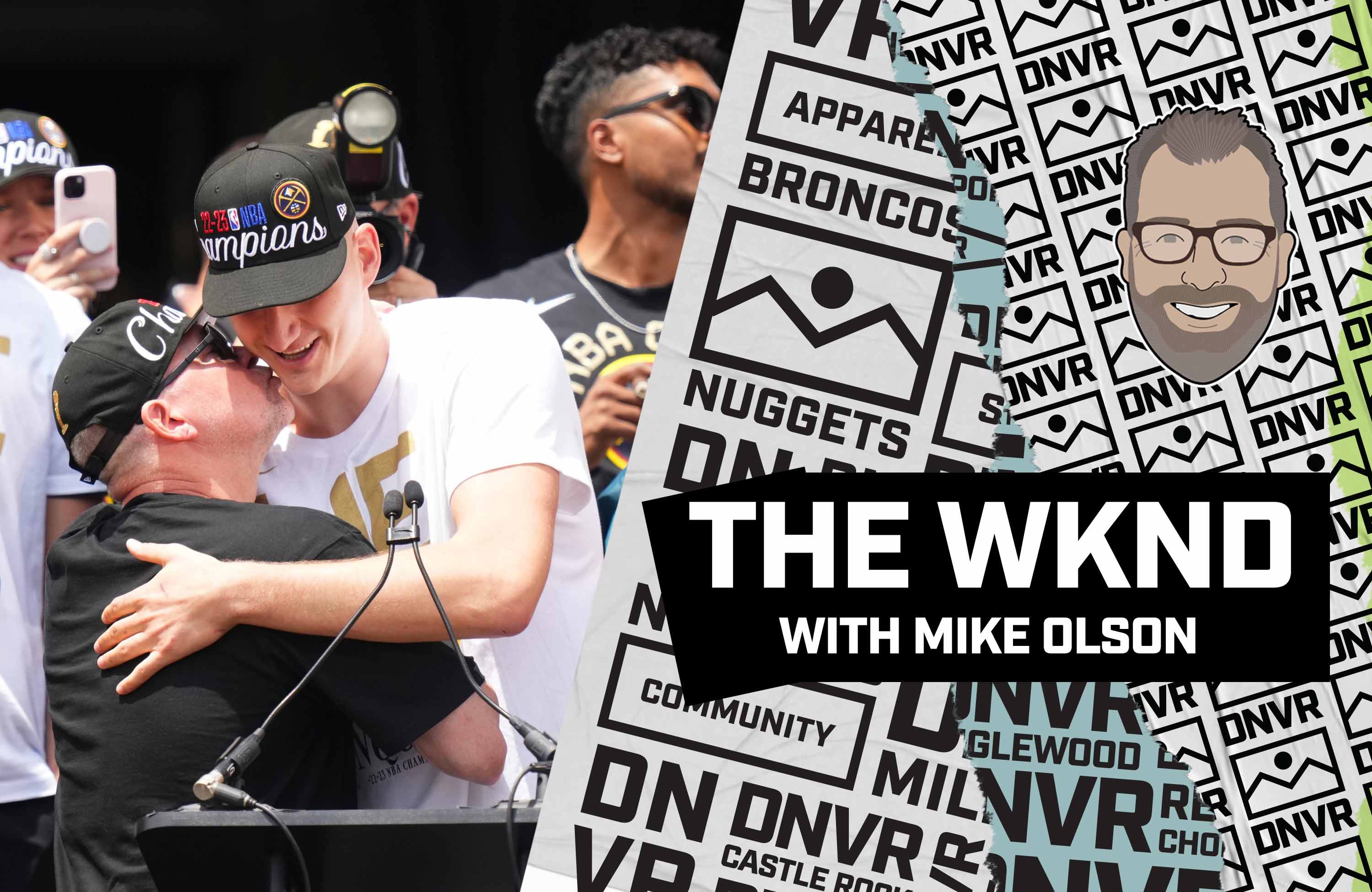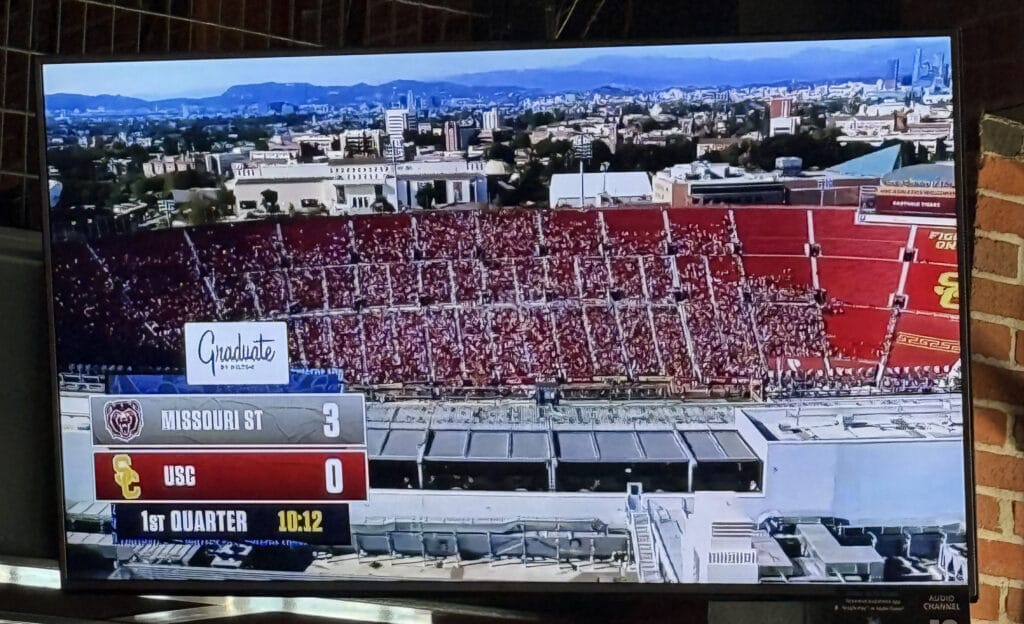© 2025 ALLCITY Network Inc.
All rights reserved.

Sitting and watching the major college football game, the team I’d gone to cheer for held the opening lead over a major powerhouse after the first drive of the game. While that wasn’t a reason to suspect they might hold their own throughout, it was at least a reason to have some hope. That hope quickly… dwindled. By the time it was over, the drubbing was all the announcers were talking about.
Am I referring to UNC/TCU? No, actually, I’d gone to a bar to watch Missouri State (a dear friend played there) get their asses handed to them by USC by 60. SIXTY. The result was actually an insult to cannon fodder, but for a moment in time, those “MO STATE” Bears were on top. No, really…

But it sure did look a lot like that North Carolina game’s outcome, and Belichick’s aura lasted all of an opening drive. But boy, that drive. It looked almost scripted. North Carolina came out with tempo, spread the field, and moved the ball impressively down the field for a touchdown. Bill, in his debut as Tar Heels head coach, appeared to have turned college football into a continuation of his decades-long magic act. It was as if the aura from Foxborough had traveled south with him, wrapped in a hoodie, daring everyone to say the old man couldn’t still conjure greatness. But then, much like that Missouri State game, reality set in. After that first drive, UNC’s offense sputtered, the defense looked like it had just been introduced to tackling, and the final score reminded us all that Belichick’s six Lombardi Trophies in 25 years weren’t magically wrapped up in that scowl. To his credit, Bill owned the moment, saying, “We’re better than what we were tonight, but we have to go out there and show that and prove it.”
At least they didn’t lose by 60.
Maybe The Hoody should be traded in for some wizard robes. That’s the way with sports alchemy. We like to tell ourselves that there’s some eternal magic in a coach, that certain sideline figures carry a kind of philosopher’s stone or mystic rubric that turns ordinary players into champions. But the harder you stare, the more it becomes clear: it usually takes two. A coach and a star. Belichick had Brady, Jackson had Jordan (and Kobe, and Shaq), Shanahan had Elway, Malone had Jokic… but now Adelman does. Will that lessen that brilliance? Doubtful, but… These combinations are remembered as partnerships, not solo acts. And when the partnerships dissolve, the question becomes whether it was the brain on the sideline or the brilliance on the field that really mattered. Turns out it’s more nuanced than a simple equation, or even a wave of a wand.
History doesn’t exactly hand out balanced answers. While it is much more common for the player to keep shining once the partnership ends, that’s not always the way. Back to Belichick. Brady is an obvious case: he left Belichick, strolled into Tampa Bay, and immediately won a Super Bowl in football’s version of a pirate costume. Belichick, left behind, managed to string together some sub-.500 seasons and a lot of general confusion. Peyton Manning is another. His Super Bowl in Denver came with Gary Kubiak, a fine coach but not exactly now remembered by history as a strategic deity. Meanwhile, Manning had been winning in Indianapolis under a rotating cast of sideline figures — Jim Mora, Tony Dungy, Jim Caldwell. Plug almost anyone in and Peyton produced 12 wins. The coaches didn’t so much unlock him as hold the keys while he drove. Was the coach not even a part of Peyton’s equation? Not so fast, as his last Super Bowl had a lot more to do with the other 21 guys on the field, the coaches, and possibly even the water boy.
Colorado sports history is dotted with these pairings. Elway and Shanahan were the local Brady-Belichick before Brady-Belichick. They captured back-to-back Super Bowls and immortalized themselves in Denver lore. But when Elway retired, Shanahan was left holding the bag of quarterbacks named Griese, Plummer, and Cutler. Fans and local pundits were foolish enough to say there would be no drop off due to “they system”. There was only one Elway. Turns out there were no more parades. The genius label peeled away as fast as the wins. Jokic and Malone were the more current alchemy experiment, but Joker also thrived the second Malone was unceremoniously asked to go. Does that mean Malone had no part? Certainly not. Jokic is already a top-20 player of all time, maybe top-10 when he’s done. Malone also seemed to understand him, protect him, and push him in ways that matter. But if it were the other way around, and Malone had stayed and were handed a roster without Jokic? He’d probably still be a solid coach, respected in the league. Would he be a title winner? Histories and stats say probably not.
The reverse cases, where the coach carries the glow without the star, are much rarer. Phil Jackson did it twice, which is why he’s in his own category. He won six titles with Jordan and Pippen, left, and then collected five more with Kobe and Shaq (and later Kobe solo). That makes him the exception that proves the rule — the ultimate opportunist of basketball alchemy, parachuting into locker rooms with a once-in-a-generation star already waiting. But could he have done that without those stars’ power? Odds are against it. Greg Popovich is another candidate. He had his stars. David Robinson. Tim Duncan. But he also had the foresight to build around international players, reinvent ball movement, and win one more well after Duncan’s prime with some guy named Kawhi. But Timmy, Manu, and Tiny were also still there. Popovich sadly had to step down or might be looking at another one down the road, guiding Victor Wembanyama into the future.
Denver fans are right to ask whether Deion Sanders falls into this experiment. His early magic in Boulder coincided with Shedeur Sanders playing quarterback at an elite level and Travis Hunter moonlighting as both a lockdown corner and a Heisman-caliber wideout. Without those two, is Deion just a marketing machine with cool sunglasses? A close Game 1 loss leaves that topic under the category of TBD. Buffs faithful believe he is building a program that will sustain itself beyond the glow of his son/stars. The early returns suggest that college football’s version of alchemy is even more star-driven than the pros. In college, the churn of rosters makes it almost impossible for a coach to thrive without a Heisman-level talent or two. Nick Saban has become the model precisely because he can recruit five stars at every position, not because his game-day adjustments are sorcery.
So why does it tilt this way? Why do players seem to carry the legacy more than coaches? A couple of reasons. First, and the obvious one, the player is the one executing in real time. A coach can call the perfect play, but if the quarterback air-mails the throw or the center bricks the shot, the genius looks… less genius-y. Second, players age into new roles more gracefully than coaches age into relevance. Brady could go from being a system quarterback to being a system unto himself. Manning could shift from laser-rocket arm to offensive coordinator in cleats. It’s also often easier to remake yourself when you are younger, which is often the province of the player, not the coach. Coaches, once they lose the generational star, don’t often reinvent themselves. They recycle, they bounce around, they try to recapture the same formula in a new place — but without the player, it rarely clicks.
There are exceptions. Andy Reid was a very good coach with Donovan McNabb in Philadelphia, always close but never crowned. Then he went to Kansas City, linked up with Patrick Mahomes, and turned into a dynasty-maker. The pairing elevated both men, but Reid changed his philosophies, and his reinvention kept him relevant until the right star came along. Steve Kerr has done something similar in Golden State, guiding Steph Curry, Klay Thompson, and Draymond Green into a dynasty, while also showing a flexibility in style that suggests he could keep coaching effectively even without generational shooters, just like Popovich. Think it’s any accident both men have played prominent roles in USA Basketball? Not likely. But if Steph had been drafted by the Knicks instead, is Kerr still a four-time champion? Hard to picture.
Denver has seen this cycle play out enough times to know the truth. George Karl won a lot of games with Carmelo Anthony, but when Melo left, Karl was promptly disinvited from the party. Dan Reeves reached three Super Bowls with Elway but lost all of them, and once Elway was paired with Shanahan, the rings finally arrived. Baseball may be the hardest game to do this with a single coach and superstar, and there is no better proof than the Dodgers’ Shohei Ohtani. For all the offense and defense that particular wizard can generate, he’d still never made the postseason until he was surrounded by a phalanx of stardom. The Rockies are still searching for their own alchemy experiment; Todd Helton, Andres Galarraga, Nolan Arenado, and Larry Walker were all great players in their moment, but no coach ever unlocked a sustainable winner around them. The Avalanche offer another example. Patrick Roy was a star goalie who seemed to be able to turn any team into a Stanley Cup champ, but his flame burned hot and eventually short. Jared Bednar, meanwhile, found his magic when paired with Nathan MacKinnon (and Cale Makar), with more magic hopefully still to come. Funny how that alchemy sometimes works.
This doesn’t mean coaches don’t matter. Belichick without Brady looks mortal, but Brady without Belichick probably never becomes that Brady. The discipline, the execution of the system, the ruthless efficiency — those were installed by the coach. Elway without Shanahan never wins two rings, just ask Dan Reeves. Jokic without Malone might still be the best player in the world, but would he be quite as trusted, as comfortable, as dominant in the postseason? We’re about to find out. As talented as David Adelman looks to be, it’s hard to imagine the 2022-23 story unfolding the same way if you swap Malone for one of the NBA’s revolving-door retreads. The alchemy is real. It just often runs out when one half of the bond leaves. But not always. Please, Joker… not always…
That first UNC game under Belichick wasn’t just a loss, it was a reminder that alchemy takes (at least) two. It was a reminder that the spell only works when both sides are in the cauldron. You can carry the wand to a new place, you can wear the same hoodie, you can even script the first drive. But if the right player isn’t there to make the potion bubble, the magic evaporates pretty quickly. In sports, maybe more than anywhere else, the formula is cruelly simple. You need the coach, and you need the star. One without the other is just a chalkboard with X’s and O’s waiting to get erased. Maybe Brady is looking to go back to school, and do some non-traditional education in his later years.
Comments
Share your thoughts
Join the conversation



